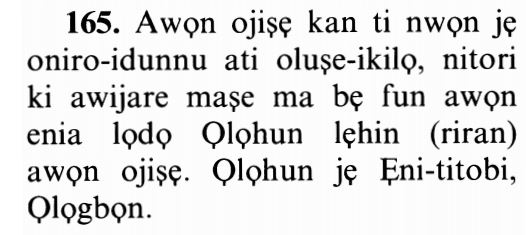4vs165
Select any filter and click on Go! to see results
رُّسُلاً مُّبَشِّرِينَ وَمُنذِرِينَ لِئَلاَّ يَكُونَ لِلنَّاسِ عَلَى اللّهِ حُجَّةٌ بَعْدَ الرُّسُلِ وَكَانَ اللّهُ عَزِيزاً حَكِيماً
Rusulan mubashshireena wamunthireena lialla yakoona lilnnasi AAala Allahi hujjatun baAAda alrrusuli wakana Allahu AAazeezan hakeeman
Index Terms
Click to play
Yoruba Translation

Hausa Translation
Manzanni mãsu bãyar da bushãra kuma mãsu gargaɗi dõmin kada wata hujja ta kasance ga mutãne a kan Allah bãyan Manzannin. Kuma Allah yã kasance Mabuwãyi, Mai hikima.
Asbabu n-Nuzuul (Occasions of Revelation)
The Reason Behind Sending the Prophets is to Establish the Proof
Allah said,
رُّسُلاً مُّبَشِّرِينَ وَمُنذِرِينَ ...
Messengers as bearers of good news as well as of warning,
meaning, the Prophets bring good news to those who obey Allah and practice the good things that please Him. They also warn against His punishment and torment for those who defy His commandments.
Allah said next,
... لِئَلاَّ يَكُونَ لِلنَّاسِ عَلَى اللّهِ حُجَّةٌ بَعْدَ الرُّسُلِ وَكَانَ اللّهُ عَزِيزًا حَكِيمًا ﴿١٦٥﴾
in order that mankind should have no plea against Allah after the Messengers. And Allah is Ever All-Powerful, All-Wise.
Allah sent down His Books and sent His Messengers with good news and warnings. He explained what He likes and is pleased with and what He dislikes and is displeased with. This way, no one will have an excuse with Allah.
Allah said in other Ayat,
وَلَوْ أَنَّآ أَهْلَكْنَـهُمْ بِعَذَابٍ مِّن قَبْلِهِ لَقَالُواْ رَبَّنَا لَوْلا أَرْسَلْتَ إِلَيْنَا رَسُولاً فَنَتَّبِعَ ءَايَـتِكَ مِن قَبْلِ أَن نَّذِلَّ وَنَخْزَى
And if We had destroyed them with a torment before this, they would surely have said: "Our Lord! If only You had sent us a Messenger, we should certainly have followed Your Ayat, before we were humiliated and disgraced.'' (20:134)
and,
وَلَوْلا أَن تُصِيبَهُم مُّصِيبَةٌ بِمَا قَدَّمَتْ أَيْدِيهِمْ
And if (We had) not (sent you to the people of Makkah) in case a calamity should seize them for (the deeds) that their hands have sent forth. (28:47)
It is recorded in the Two Sahihs that Ibn Mas`ud said that the Messenger of Allah said,
لَا أَحَدَ أَغْيَرُ مِنَ اللهِ، مِنْ أَجْلِ ذلِكَ حَرَّمَ الْفَوَاحِشَ مَا ظَهَرَ مِنْهَا وَمَا بَطَنَ،
وَلَا أَحَدْ أَحَبْ إِلَيْهِ الْمَدْحُ مِنَ اللهِ عَزَّ وَجَلَّ، مِنْ أَجْلِ ذلِكَ مَدَحَ نَفْسَهُ،
وَلَا أَحَدَ أَحَبْ إِلَيْهِ الْعُذْرُ مِنَ اللهِ، مِنْ أَجْلِ ذلِكَ بَعَثَ النَّبِيِّينَ مُبَشِّرِينَ وَمُنْذِرِين
No one is more jealous than Allah. This is why He prohibited all types of sin committed in public or secret.
No one likes praise more than Allah, and this is why He has praised Himself.
No one likes to give excuse more than Allah, and this is why He sent the Prophets as bearers of good news and as warners.
In another narration, the Prophet said,
مِنْ أَجْلِ ذلِكَ أَرْسَلَ رُسُلَهُ وَأَنْزَلَ كُتُبَه
And this is why He sent His Messengers and revealed His Books.
وقوله " رسلا مبشرين ومنذرين " أي يبشرون من أطاع الله واتبع رضوانه بالخيرات وينذرون من خالف أمره وكذب رسله بالعقاب والعذاب وقوله " لئلا يكون للناس على الله حجة بعد الرسل وكان الله عزيزا حكيما " أي أنه تعالى أنزل كتبه وأرسل رسله بالبشارة والنذارة وبين ما يحبه ويرضاه مما يكرهه ويأباه لئلا يبقى لمعتذر عذر كما قال تعالى " ولولا أنا أهلكناهم بعذاب من قبله لقالوا ربنا لولا أرسلت إلينا رسولا فنتبع آياتك من قبل أن نذل ونخزى " وكذا قوله " ولولا أن تصيبهم مصيبة بما قدمت أيديهم " الآية . وقد ثبت في الصحيحين عن ابن مسعود قال : قال رسول الله صلى الله عليه وسلم " لا أحد أغير من الله من أجل ذلك حرم الفواحش ما ظهر منها وما بطن ولا أحد أحب إليه المدح من الله عز وجل من أجل ذلك مدح نفسه ولا أحد أحب إليه العذر من الله من أجل ذلك بعث النبيين مبشرين ومنذرين " . وفي لفظ آخر " من أجل ذلك أرسل رسله وأنزل كتبه " .
"رسلا" بدل من رسلا قبله "مبشرين" بالثواب من آمن "ومنذرين" بالعقاب من كفر أرسلناهم "لئلا يكون للناس على الله حجة" تقال "بعد" إرسال "الرسل" إليهم فيقولوا : ربنا لولا أرسلت إلينا رسولا فنتبع آياتك ونكون من المؤمنين فبعثناهم لقطع عذرهم "وكان الله عزيزا" في ملكه "حكيما" في صنعه
هو نصب على البدل من " ورسلا قد قصصناهم " ويجوز أن يكون على إضمار فعل ; ويجوز نصبه على الحال ; أي كما أوحينا إلى نوح والنبيين من بعده رسلا .
I'raab - grammatical analysis of the Qur'an
«و رُسُلًا» بدل «رُسُلًا» قبله منصوب بالفتحة.
«مُبَشِّرِينَ» صفة لرسلا أو حال منصوبة بالياء.
«وَمُنْذِرِينَ» عطف.
«لِئَلَّا» اللام لام التعليل وأن حرف مصدري ونصب ولا نافية.
«يَكُونَ لِلنَّاسِ عَلَى اللَّهِ حُجَّةٌ» للناس متعلقان بمحذوف خبر الفعل الناقص يكون ، على اللّه لفظ الجلالة مجرور بعلى متعلقان بالخبر المحذوف وحجة اسمها ، وأن مع الفعل الناقص في تأويل مصدر في محل جر باللام والجار والمجرور متعلقان بمبشرين أو منذرين.
«بَعْدَ» ظرف زمان متعلق بمحذوف صفة حجة.
«الرُّسُلِ» مضاف إليه.
«وَكانَ اللَّهُ عَزِيزاً حَكِيماً» كان ولفظ الجلالة اسمها وعزيزا حكيما خبراها.
